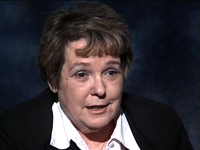| Joan Furey |

Joan Furey [2002] | Vietnam War, 1961-1975
Army
71st Evacuation Hospital
San Francisco, California; Fort Meade, Maryland; Pleiku, Vietnam
First Lieutenant
Brooklyn, NY
 |
|
 |
A year out of nursing school, Joan Furey was working an Intensive Care Unit in a hospital in the Central Highlands of Vietnam. Her year there was an accelerated course in applied nursing techniques. Both the intensity of her daily shifts and the democratic nature of her unit, where nurses were given decision-making latitude by the doctors in the interests of serving the patients, spoiled her for civilian nursing in more relaxed and structured surroundings. She came to discover a delayed reaction to the stress of her wartime experiences and gained a better understanding of postwar trauma suffered by the soldiers she had treated.
|
|

